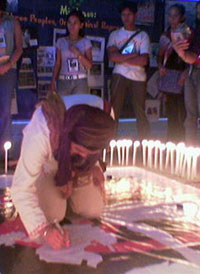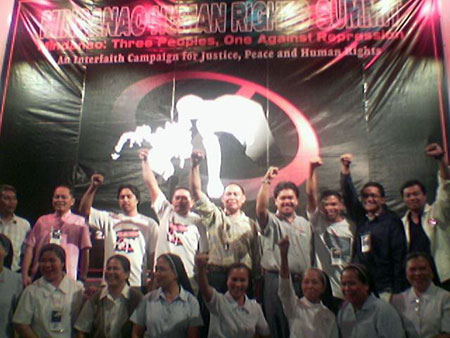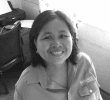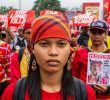
In a recent human-rights summit, participants recounted incidents of human-rights abuses and sheer terror in the hands of government forces. They also decried the continuing militarization in Mindanao that displaces and terrorizes communities but benefits big logging, mining and other multinational companies. Davao Today’s Tyrone Velez reports.
Related Stories:
Mindanao Human Rights Summit: Declaration of Unity
Human Rights Watch: Climate of Fear Impedes Probe Into Killings
Pimentel Cites Reasons Why Melo Commission Is Getting Nowhere
Political Killings in RP: Operation Phoenix�s Long Shadow
 DAVAO CITY — Eleven-year old Jason stood on stage, stuttered and, in a whisper, spoke of that day last year when soldiers held up his family during an operation in Surigao del Sur. One of the soldiers, he said, put a knife on his neck and ordered him to dig up his own grave.
DAVAO CITY — Eleven-year old Jason stood on stage, stuttered and, in a whisper, spoke of that day last year when soldiers held up his family during an operation in Surigao del Sur. One of the soldiers, he said, put a knife on his neck and ordered him to dig up his own grave.
Ailyn Morales narrated how gunmen went to their house on Jan. 28, shot her husband Mateo and fled on a motorcycle. Months earlier, Mateo had caught the suspicion of the military for administering an infirmary for the Lumads ran by the Religious Good Shepherd in San Luis, Agsuan del Sur. The military claimed the hospital was for the Communist New People�s Army.
The deaths of George and Maricel Vigo last June 19 had left their four children psychologically scarred and traumatized, said Gregorio Avale, brother of Maricel. Their deaths remain unsolved.
These are stories that survivors and families of victims of political killings and harassments shared during the Mindanao Human Rights Summit from Sept. 22 to 23 at the CAP Auditorium in Davao City.
The summit gathered church people, Moro and indigenous peoples, lawyers, members of the academe, journalists, farmers, workers, and youths from the six regions in Mindanao to launch the campaign called “Three peoples, one against repression” against the rise of political killings and militarization in Mindanao.
 The human rights group Karapatan reported during the summit 46 cases of summary killings of activists, church people and civilians in Mindanao this year.
The human rights group Karapatan reported during the summit 46 cases of summary killings of activists, church people and civilians in Mindanao this year.
“Beyond statistics and identifying the perpetrators, the purpose of this summit is to give us answers. Why this escalating number of killings and harassments in Mindanao?” asks lawyer Beverly Selim-Musni of InPeace Mindanao, one of the groups that convened the summit.
The convenors singled out Arroyo’s all-out war campaign for the widespread violations of human rights, which they said in their declaration “transforms the island into a single laboratory of the AFP’s Oplan Bantay Laya.”
Musni drove the point further, saying Arroyo’s economic blueprint for Mindanao relies on the military’s “clear-hold-consolidate” strategy to rid activists and leaders in communities who oppose irresponsible mining, logging and the expansion of plantations that displace people.
The reports from Karapatan Caraga and Socsksargen noted such pattern. Peasant and Lumad leaders in Agusan del Norte like Hermilino Marquez and Jovito Pinakilid who opposed mining and other activities were liquidated by death squads in recent weeks. In Sultan Kudarat, B’laan communities encounter year-round military operations resulting in evacuations, disruption of economic activities and deaths This, Karapatan said, is made to soften their resistance to the mining expansion of Sagittarius Mines Inc.
“This is not simply a counter-insurgency campaign because it is targeting the civilians. As communities are being bulldozed away, so are the rights of the people. Whose freedom and development is being pursued here?” Musni asked.
 The delegates also assailed the rising military presence in communities which they said trample on the rights of the people. They cited incidents of the military conducting lectures of “Knowing the Enemy,” which tagged open and legal groups as fronts for the communists, in barrios and schools, the red-tagging of activists and leaders, the interrogation of members of organizations, recruitment of Cafgus, and the blockading of food and health services.
The delegates also assailed the rising military presence in communities which they said trample on the rights of the people. They cited incidents of the military conducting lectures of “Knowing the Enemy,” which tagged open and legal groups as fronts for the communists, in barrios and schools, the red-tagging of activists and leaders, the interrogation of members of organizations, recruitment of Cafgus, and the blockading of food and health services.
“The dominating presence of the military clearly subverts the rule of law, the regular functions of the local government units, and the constitutionally mandated civilian supremacy,” the summit declared.
Relatives of victims such as Morales and Alave also point out how justice is denied them. Both of them said they have received threats for pursuing their cases. “I am the one who is seeking justice. But why is it that I am the one on the run?” asked Morales.
Carlos Isagani Zarate of the Union of Peoples’ Lawyers in Mindanao noted that, in spite of these cases of human rights violations, “justice, like the rivers in Mindanao, will flow for the people.”
The summit issued resolutions which include launching campaigns to stop military operations and pull out military and paramilitary forces in communities in Mindanao; creating support services and legal counsel for families and survivors of political killings and harassments; launching human rights education in communities, church and academe; launching international campaigns to highlight the cases in Midnanao.
Around sixty organizations coming from different sectors in Mindanao expressed their participation in the campaign.
The summit ended with the delegates lighting up candles for justice in the CAP grounds. (Tyrone A. Velez/davaotoday.com)
Extrajudicial Killings









